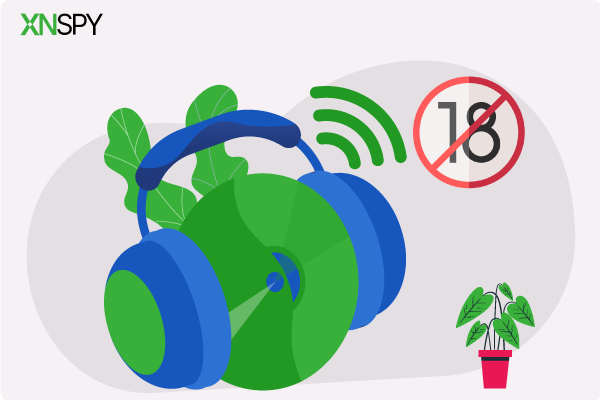The complete monitoring experience for your phone
Get XNSPY and start tracking calls, texts, multimedia, locations and more on any phone!
Get Started Now Live DemoInternet safety is a relevant discussion even with today’s kids. With the availability of technology, not only are kids exposed to a wealth of information and communication opportunities but also exposed to material considered dangerous and even illegal.
In some cases, the issue can affect their well-being, while, in other cases, it may affect their mental health as they continue to roam free on the Internet. This article will help you find answers if you have questions on how to keep kids safe online and how children’s internet safety can be improved.
What Problems are Present on The Internet Currently?
Computer safety for kids is a complex topic due to the risks attached to online surfing. Even kids younger than eighteen are freely allowed to surf the web. It is therefore highly possible to get exposed to issues such as cyberbullying, sexting, and even identity theft through the Internet.
But online safety for kids should be everyone’s priority that can be made easier if you know the problems that come with it. So let’s take a look at the dangers present on the internet. These are:
- Cyberbullying
- Inappropriate Content
- Fake News
- Online Predators
Let’s see how each of these affects kids, particularly their mental health and physical well-being.
a. Cyberbullying
Cyberbullying is a form of harassment done through electronic or digital media, including email, texts, voice messages, social media posts, etc. And the toxic culture of social media is to be blamed for it.
Because anyone can seek the name of someone they don’t like and message them by making a phony profile, social media is one of the main causes of cyberbullying. Additionally, they can single out a specific person and comment on their appearance, physique, etc.
People who struggle with body image and lack confidence should avoid these comments and threatening communications because they could reinforce their unfavorable opinions of themselves. It all starts to make sense if you look at the stats and realize just how prevalent cyberbullying has gotten over the last few years.
- More than 36% of kids aged 12 to 17 have been cyberbullied at least once in their life, and almost 15% have bullied someone else online.
- Boys are more likely to bully others, whereas girls are more likely to get bullied.
b. Inappropriate Content
Inappropriate content includes the following:
- Content that is sexually explicit, especially pornographic photographs and videos.
- Content that is violent or explicit, such as gore or violence.
- Content that is vulgar or improper for children, such as porn, drug or alcohol use, or profane language.
Inappropriate content is one of the leading threats posed by the Internet to kids simply because of its abundance. Violent and sexual content can severely impact a child’s mental development as their minds are still developing, and such content can cause distress and wreak emotional havoc.
Offensive language, racist remarks, hate speech and violent or sexual imagery can be especially devastating to kids because kids are sensitive to their environment and highly impressionable. More than 55% of tweens (kids aged 10–12) have been exposed to violent content on the internet, and almost 60% have come across adult content that includes sexual texts and images.
c. Fake News
The internet, especially social media is a primary source of false information in today’s society, due to its ability to reach so many individuals. Social media serves as a haven for false assertions and unsupported claims. As most social media platforms cannot fully control what gets posted, it is hard to stop fake news from spreading like wildfire.
Kids reading fake information will most likely take it at face value and when others try to correct them, they will become defensive and won’t believe them. This causes confusion and mistrust and can push kids down the road of conspiracy theories and false rhetoric.
d. Online Predators
Online predators are quite common on the Internet. Online predators are adults who want to gain sexual favors from kids or exploit them for entertainment. And anyone who is not an adult can be a victim of online predators because they are good at hiding their motives and intentions behind a veil of lies and deceit.
Girls make up the majority (78%) of young victims of online luring, whereas males make up the majority (82%) of online predators. And the scariest bit of all, 98% of online predators have never actually met the kids they prey on. It is terrifying because anyone can become a victim of these individuals.
So what can parents do to improve children’s online safety?
7 Safety Tips For Parents To Keep Their Kids Safe Online
Follow these tips to know how to keep kids safe online.
1. Minimize The Time Your Kids Spend Online
Limiting your children’s use of their phones is one of the best methods to keep them off the internet. The majority of global online traffic is generated by smartphones. Reports suggest that 54% of all web traffic comes from mobile devices.
Therefore, setting limits on how much time they spend on their phones is a good idea. Establishing time zones during which children can use their smartphones to browse the Internet will keep them under supportive eyes. This strategy allows parents to track how frequently kids use their phones.
Arrange some activities on the weekends, such as picnics or pop trivia nights. It will help pass the time and take your thoughts off of the Internet. It helps kids become less dependent on their devices and instead participate in physical activity or spend time with the family.
2. Teach Kids Better Online Safety
Social media has become a must-have for kids and teens. They use it for their daily communication, sharing funny posts, and keeping updated with current events.
Talk to your children about good social media habits and online practices. Encourage them to be aware of their feelings before, during, and after using social media. Talk about how they’re feeling, whether it’s good or bad.
You can assist them with resolving issues, setting social media limits, and utilizing privacy and content filtering capabilities. Teach them the ropes, lead by example and show what kind of content you post online and what security settings you use.
So let’s help kids stay safe online by becoming more empathetic to their woes.
3. Use Parental Control Apps
Monitoring apps are helpful since they offer a wide range of capabilities that can keep kids safe in several situations. They provide kids with online safety tools that parents can easily utilize even if they have busy routines.
Parents are concerned about cellphone addiction since it can be dangerous due to the widespread use of cell phones as a constant source of distraction. Parental control applications make it simpler to keep an eye on kids to ensure they are not using their phones excessively.
One such tool for providing cyber safety for kids on Android and iOS devices is XNSPY.
XNSPY gathers data covertly from a target phone without affecting the phone’s routine functionality. By enabling parents to monitor their children’s interactions and the content they view, XNSPY can help keep kids’ phone use safe.
Additionally, the program doesn’t need any technical expertise to utilize and has an easy setup process that is compatible with the most recent Android and iOS devices with several child monitoring features.
Taking essential information from your child’s phone helps protect them. Live location information, social media monitoring, instant messaging apps, internet history, and surround recording are all included in the data.
So let’s say you want to keep them safe from violent or sexual content. You can use the web history tracker feature to check your kids’ browsing history. It ensures they aren’t viewing inappropriate content. You can even block the website you deem unsafe.
Similarly, you can use XNSPY to protect kids from cyberbullying by blocking social media apps from their phones with a simple toggle switch found under app usage.
4. Teach Them About the Harms of the Internet
It is our duty as parents to educate our children about the risks associated with excessive Internet use.
Remind dangers of the internet for children, including the threat of violence, fake news, spam accounts, phishing, malware, and ransomware assaults.
You can’t rely on youngsters to protect themselves online as a result even though it is true that this generation has a much greater grasp of technology than our parents.
So, while acknowledging the possibility that they may be more Internet-savvy than you, try to teach them as much as you can and remind them of the importance of internet safety.
5. Ensure You Are Aware of What Your Kids Post
Every image and private information posted on social media and the internet adds to a person’s digital footprint. The essential point in this situation is that information can be used in unanticipated and uncontrollable ways once it is made public.
These details could be replicated by malicious actors to harass others and tarnish one’s reputation. They might even go so far as to con people and exploit one’s profile for extortion.
Children and teenagers must therefore take extra care to protect their photos and personal information. The same may be taken into account for you as parents. Be mindful of the repercussions before posting public photos of your kids on social media. As predators may see these photos and misuse them. So always keep in mind this golden rule of internet safety tips for kids.
6. Update Everything
Making sure that all hardware, software, and firmware are up to date is one of the best methods to keep kids safe online.
Updates can appear to be a hassle, but releasing security updates that address the most recent and inventive threats is one of the main reasons developers release new versions of their software.
Additionally, outdated software may make your security software and privacy settings ineffective. So you can protect yourself and your kids by updating your software to ensure there aren’t any vulnerabilities that hackers can exploit.
7. Avoid Suspicious Websites
Be wary of suspicious websites that do not have an HTTPS encryption certificate or have run-down UI or spelling mistakes. Because, most often than not, these websites are only made for harvesting data or spreading malware on your computer.
If these websites ask you to fill out a form and include fields like address and date of birth, steer clear unless you can see it has an SSL certificate.
Conclusion
Internet safety measures are by no means a substitute for parental supervision, but they can act as an extra layer of security between kids and potential dangers. Anyone who wants to get started on internet safety for kids should take the time to explore these seven proven methods before diving into more advanced territory like IP routing or Mac Filtering. We’re confident that these methods will be more than enough to help you safeguard your kids without overwhelming yourself.


